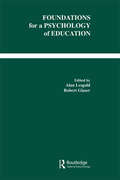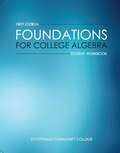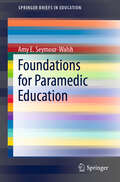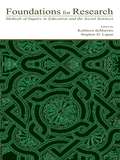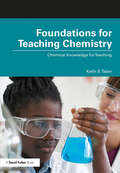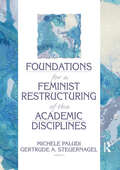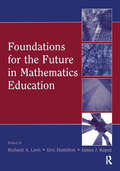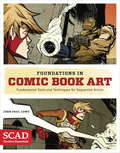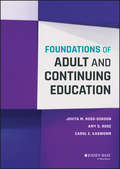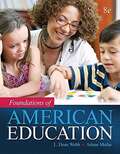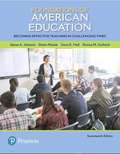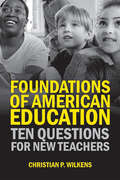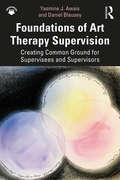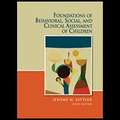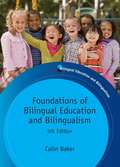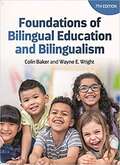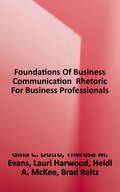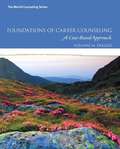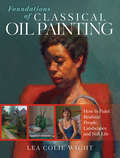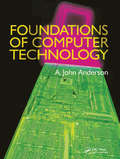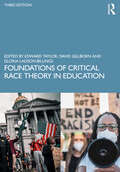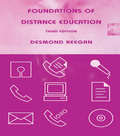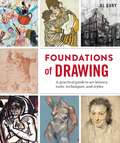- Table View
- List View
Foundations for A Psychology of Education
by Robert Glaser Alan LesgoldThe chapters in this collection illustrate how current concepts and principles from various disciplines can be viewed from the perspective of their value to educational process thinking. While not providing specific prescriptions for educational problems, the articles provide relevant experimental and theoretical knowledge has accumulated in many fields including learning theory, cognitive development, motivation, and intellectual abilities and attitudes.
Foundations for Christian Education
by John W. Wade Eleanor A. DanielDaniel and Wade discuss the foundations for an effective Christian Education program, and tackle organizational and administrative issues involved with such a program. You will also find age specific information for all ages of learners. If you are a Christian Ed. Director, or a teacher who wants to better understand the elements of a C. E. program that will make a difference in the lives of the teachers and the students, this is the book for you.
Foundations for Paramedic Education (SpringerBriefs in Education)
by Amy E. Seymour-WalshThis book addresses the nature of professional learning, paramedic skill development, practice assessment, and feedback from both clinical and educational theory perspectives. It provides clear guidance from the literature, learning theory, and current research to help clinical educators plan robust professional education activities that address students’ learning needs and clinical practice expectations. Based on the premise that assessment of practical skills and applied knowledge is integral to paramedic education, the book presents a worked example of a validated assessment approach. Each chapter contains realistic case studies for the array of paramedic education contexts, including simulated supervision, continuing in-service education, tertiary education and formal graduate programs. All chapters include a series of questions designed to guide both individual and group-based reflection on educational practice and philosophy.
Foundations for Research: Methods of Inquiry in Education and the Social Sciences
by Stephen D. Lapan Kathleen B. DeMarraisDesigned for introductory research courses in the professional fields and social sciences, this text acquaints students and beginning researchers with a broad view of research methodologies and an understanding of the assumptions that inform each of these approaches. More experienced researchers will also find the book useful in acquainting them with methodologies and theoretical frameworks that are new to them. The text is distinguished by its avoidance of using the discreet categories of qualitative and quantitative methods to organize the chapters. While some chapter authors rely more on one or the other, many employ multiple methodologies to investigate particular problems and questions. Further, the book is not organized into single, contradictory positivist-interpretivist categories of research; chapter authors often situate methodologies within a variety of, and sometimes multiple, theoretical positions, particularly as these approaches are shaped by the historical context of social science research. Focus points in Foundations for Research: Methods of Inquiry in Education and the Social Sciences: *research ethics.*intertwined relationship of theory and research design. *systematic examination of ways to design and implement high-quality, trustworthy research across varying research designs. *specific methods for implementing research within various frameworks. *pedagogical strategies.
Foundations for Teaching Chemistry: Chemical Knowledge for Teaching
by Keith S. TaberChemistry is a subject that has the power to engage and enthuse students but also to mystify and confound them. Effective chemistry teaching requires a strong foundation of subject knowledge and the ability to transform this into teachable content which is meaningful for students. Drawing on pedagogical principles and research into the difficulties that many students have when studying chemical concepts, this essential text presents the core ideas of chemistry to support new and trainee chemistry teachers, including non-specialists. The book focuses on the foundational ideas that are fundamental to and link topics across the discipline of chemistry and considers how these often complex notions can be effectively presented to students without compromising on scientific authenticity. Chapters cover: the nature of chemistry as a science the chemistry triplet substances and purity in chemistry the periodic table energy in chemistry and chemical bonding contextualising and integrating chemical knowledge Whilst there are a good many books describing chemistry and many others that offer general pedagogic guidance on teaching science, Foundations for Teaching Chemistry provides accounts of core chemical topics from a teaching perspective and offers new and experienced teachers support in developing their own ‘chemical knowledge for teaching’.
Foundations for a Feminist Restructuring of the Academic Disciplines
by Ellen Cole Esther D Rothblum Michele Paludi Gertrude A SteuernagelHere is a useful and illustrative guide for those interested in the impact of feminist scholarship on traditional academic disciplines. This important book explores the changes that have taken place in the academic world as a result of feminist approaches to scholarship, including issues of staffing, organization, administration, recruitment, stude
Foundations for the Future in Mathematics Education
by Richard A. Lesh; Eric Hamilton; James J. KaputThe central question addressed in Foundations for the Future in Mathematics Education is this: What kind of understandings and abilities should be emphasized to decrease mismatches between the narrow band of mathematical understandings and abilities that are emphasized in mathematics classrooms and tests, and those that are needed for success beyond school in the 21st century? This is an urgent question. In fields ranging from aeronautical engineering to agriculture, and from biotechnologies to business administration, outside advisors to future-oriented university programs increasingly emphasize the fact that, beyond school, the nature of problem-solving activities has changed dramatically during the past twenty years, as powerful tools for computation, conceptualization, and communication have led to fundamental changes in the levels and types of mathematical understandings and abilities that are needed for success in such fields. For K-12 students and teachers, questions about the changing nature of mathematics (and mathematical thinking beyond school) might be rephrased to ask: If the goal is to create a mathematics curriculum that will be adequate to prepare students for informed citizenship—as well as preparing them for career opportunities in learning organizations, in knowledge economies, in an age of increasing globalization—how should traditional conceptions of the 3Rs be extended or reconceived? Overall, this book suggests that it is not enough to simply make incremental changes in the existing curriculum whose traditions developed out of the needs of industrial societies. The authors, beyond simply stating conclusions from their research, use results from it to describe promising directions for a research agenda related to this question. The volume is organized in three sections: *Part I focuses on naturalistic observations aimed at clarifying what kind of “mathematical thinking” people really do when they are engaged in “real life” problem solving or decision making situations beyond school. *Part II shifts attention toward changes that have occurred in kinds of elementary-but-powerful mathematical concepts, topics, and tools that have evolved recently—and that could replace past notions of “basics” by providing new foundations for the future. This section also initiates discussions about what it means to “understand” the preceding ideas and abilities. *Part III extends these discussions about meaning and understanding—and emphasizes teaching experiments aimed at investigating how instructional activities can be designed to facilitate the development of the preceding ideas and abilities. Foundations for the Future in Mathematics Education is an essential reference for researchers, curriculum developers, assessment experts, and teacher educators across the fields of mathematics and science education.
Foundations in Comic Book Art
by John Paul LoweA comprehensive guide to creating and developing comic book and graphic novel art, from the Savannah College of Art and Design (SCAD), one of the world's leaders in sequential arts instruction.John Lowe, Dean of the School of Communication Arts at SCAD, presents an in-depth primer on the tools and techniques used by top sequential artists to crate comic books, graphic novels, and other sequential art forms. Based on SCAD's world-famous sequential arts curriculum with examples of professional comic book art from their faculty and alumni, the book uses detailed instruction and step-by-step examples to teach key artistic methods like sketching, thumbnailing, reference gathering, and using production/digital design methods. This book covers all the materials and methods aspiring artists need to master to make it as sequential artists.
Foundations in Human Development (Second Edition)
by Jerry J. Bigner Troianne GraysonFoundations in Human Development is a comprehensive and engaging introduction to life span development. With a unique blend of classical studies and cutting-edge research, the reader is provided a context in which he or she is able to appreciate the historical foundations of life span development, as well as current themes and findings.
Foundations of Adult and Continuing Education
by Amy D. Rose Carol E. Kasworm Jovita M. Ross-GordonA research-based foundational overview of contemporary adult education Foundations of Adult and Continuing Education distills decades of scholarship in the field to provide students and practitioners with an up-to-date practical resource. Grounded in research and focused on the unique needs of adult learners, this book provides a foundational overview of adult education, and an introduction to the organizations and practices developed to support adult learning in a variety of contexts. The discussion also includes select understandings of international adult education, policy, and methods alongside theoretical frameworks, contemporary and historical contexts, and the guiding principles of adult education today. Coverage of emerging issues includes the aging society, social justice, and more, with expert insight from leading authorities in the field. Many adult educators begin practice through the context of their own experiences in the field. This book provides the broader research, theory, and practice needed for a deeper understanding of adult education and its place in society. Learn the key philosophical and theoretical frameworks of adult education Survey the landscape of the field through contemporary and historical foundations Examine key guiding understandings and practices targeted to adult learners Delve into newer concerns including technology, globalization, and more Foundations of Adult and Continuing Education provides an expertly-led overview of the field, and an essential introduction to real-world practice.
Foundations of American Education
by L. Dean Webb Arlene Metha K. Forbis JordanThis classic text provides a clear picture of why the fundamentals of American education are important to today’s teachers–and how the evolution of education affects today’s teaching and learning. It focuses on helping students become highly qualified teachers by connecting theory and practice, examining the philosophical and historical roots of education as well as its current structures, and exploring the real-life challenges facing teachers and the future of education and the teaching profession. Comprehensive, up to date, and balanced, Foundations of American Education shows students how to read, think about, and respond to current educational issues; asks them to reflect on how the past influences education today; and helps to prepare them to become professional educators. The new edition provides a fresh look at such topics as government involvement in education, the national standards, student achievement data, charter schools, and the minority to majority demographic shift in the student population. The Enhanced Pearson eText features embedded videos and assessments.
Foundations of American Education: Becoming Effective Teachers in Challenging Times
by Donna M. Gollnick Gene E. Hall James A. Johnson Diann L. MusialEducation constantly changes-and teachers need to continue learning through professional development and educational research to improve their performance in tomorrow's classrooms. Foundations of American Education addresses the realities and challenges of teaching head on. With many new references and an emphasis on emerging trends that are impacting our schools, such as the Common Core Standards, Every Student Succeeds Act (ESSA), and social and global networking, this text encourages students to embrace new methods of instruction. Concepts are explored through current discussions of theory and practice in such critical areas as advocacy, legislation, and the current social, political, and economic climate.
Foundations of American Education: Ten Questions for New Teachers
by Christian P. WilkensAnswers all the questions that students preparing for a career in education ask.Foundations of American Education asks many of the questions new teachers face: How should I handle classroom management? How will I know if students are learning what they should? What should I do in class my first year? How can I make things better for students? This book addresses major topics covered by introductory-level education classes, such as the history of US public schools, curriculum and assessment, classroom management, school governance, law, and more. Each chapter includes stories and examples from real teachers and schools and closes with a major US court case about public education. A major goal for the volume is to develop a sense for what US public school teachers do now and how we might be able to do better in the years ahead.
Foundations of Art Therapy Supervision: Creating Common Ground for Supervisees and Supervisors
by Daniel Blausey Yasmine J. AwaisFoundations of Art Therapy Supervision serves as a reference guide for art therapists who have found themselves in supervisor roles without prior training and supervisees hoping to learn what to expect from the supervision relationship, and illustrates how to receive and provide clinical art therapy supervision. Written by two art therapists with over 35 years of collective supervision experience, this new resource includes a framework for providing effective supervision in the classroom and in the field, case studies and art-based supervisory exercises, and guidance for new professionals seeking certification or licensure. Chapters weave the authors’ supervision experience with a significant literature review, and feature explanations on how professional identities (art therapist, psychotherapist, counselor, supervisor, supervisee, administrator, educator, etc.) and personal identities (gender, race, sexuality, etc.) influence the supervisory and therapeutic relationships. This book will teach supervisees how to make the most of their experience while simultaneously providing a comprehensive reference for practicing supervisors.
Foundations of Behavioral, Social, and Clinical Assessment of Children: Sixth Edition
by Jerome M. SattlerThe Sixth Edition of Foundations of Behavioral, Social, and Clinical Assessment of Children, which also includes the Resource Guide to Accompany Foundations of Behavioral, Social, and Clinical Assessment of Children, Sixth Edition
Foundations of Bilingual Education and Bilingualism
by Colin BakerThe fifth edition of this bestselling book provides a comprehensive introduction to bilingualism and bilingual education. In a compact and clear style, its 19 chapters cover all the crucial issues in bilingualism at individual, group and national levels.
Foundations of Bilingual Education and Bilingualism
by Colin Baker Wayne E. WrightThe seventh edition of this bestselling textbook has been extensively revised and updated to provide a comprehensive and accessible introduction to bilingualism and bilingual education in an everchanging world. <p><p> Written in a compact and clear style, the book covers all the crucial issues in bilingualism and multilingualism at individual, group and societal levels. Updates to the new edition include.
Foundations of Business Communication: Rhetoric for Business Professionals
by Lauri Harwood Heidi A. McKee Gina C. Dutro Theresa M. Evans Brad ReitzFoundations of Business Communication: Rhetoric for Business Professionals, was written by the faculty of BUS 102 to provide a resource to help you in BUS 102, in your other FSB courses, and in your professional career. - Chapter 2: Business Communication Today explains the importance of effective communication in today's globally networked workplace and defines the characteristics of effective business communication. - Chapter 3: Rhetoric in Business Communication introduces the key concepts and strategies of rhetoric, the art and practice of effective communication. You will learn how to analyze the rhetorical situation of business communication so that you can craft effective messages appropriate for your purpose, audience, and context. - Chapter 4: Delivering Oral Communications examines the rhetoric of oral delivery, strategies for organizing oral communications, and design tips for presentation visuals. The primary focus is on extemporaneous presentations, but oral communications in other business contexts are also considered. - Chapter 5: Developing Business Relationships explains how to introduce yourself within business communities and how to frame requests that establish goodwill with your audience(s). This chapter also has tips for writing business emails. - Chapter 6: Business Communication Processes provides guidelines for the composing process for a variety of oral and written communications. - Chapter 7: Planning for the Job Search offers an overview of the job search communication process, from locating position announcements and networking to interviewing and job acceptance communications. - Chapter 8: Writing Cover Letters has information and advice on how to write a cover letter that will stand out to prospective employers. The assignment scenario focuses on opportunities available to early career college students, and from this project many students have found excellent summer internships and jobs. - Chapter 9: Collaborating and Communicating as a Team builds from the work on collaboration begun in BUS 101 and delves into the specifics of how to research, write, and present as a team. - Chapter 10: Reporting Your Findings examines the structure of formal recommendation reports and provides foundational strategies for how to narrate and represent qualitative and quantitative data. - Chapter 11: Making Recommendations explains how to deliver credible recommendations in writing and orally that are clear, concise, and thorough. - Chapter 12: Looking Back, Moving Forward covers the importance of reflective analysis for transferring learning from your first-year experiences into FSB's upper division core and major courses and on into your professional careers.
Foundations of Career Counseling: A Case-Based Approach (First Edition)
by Suzanne M. DuggerThis text is designed for professors and counselor-educators interested in finding ways to excite graduate students about the theory and practice of career counseling. <P><P>This text uses a case-based approach to engage students in the study of what can sometimes be rather dry content.
Foundations of Classical Oil Painting: How to Paint Realistic People, Landscapes and Still Life
by Lea WightProfessional painting instructor Lea Colie Wight demystifies the formulaic process of oil painting into a simple approach to help you paint confidently and accurately in full color. Develop a core foundational skill set to develop your paintings and discover a signature way of working from life that can be applied to figure painting, portraits, landscapes and still life. Though the focus is on oils, the methods in this book can be applied to all painting mediums including as acrylic, pastel and watercolor.Informative lessons and simple exercises help to build confidence and lay the foundations for successful oil paintingLearn a straightforward system for painting realistically with a focus on accurate color.4 full-length step-by-step demonstrations show how to paint a figure, a portrait, a still life and a landscape
Foundations of Computer Technology
by Alexander John AndersonFoundations of Computer Technology is an easily accessible introduction to the architecture of computers and peripherals. This textbook clearly and completely explains modern computer systems through an approach that integrates components, systems, software, and design. It provides a succinct, systematic, and readable guide to computers, providing a springboard for students to pursue more detailed technology subjects.This volume focuses on hardware elements within a computer system and the impact of software on its architecture. It discusses practical aspects of computer organization (structure, behavior, and design) delivering the necessary fundamentals for electrical engineering and computer science students. The book not only lists a wide range of terms, but also explains the basic operations of components within a system, aided by many detailed illustrations. Material on modern technologies is combined with a historical perspective, delivering a range of articles on hardware, architecture and software, programming methodologies, and the nature of operating systems. It also includes a unified treatment on the entire computing spectrum, ranging from microcomputers to supercomputers.Each section features learning objectives and chapter outlines. Small glossary entries define technical terms and each chapter ends with an alphabetical list of key terms for reference and review. Review questions also appear at the end of each chapter and project questions inspire readers to research beyond the text. Short, annotated bibliographies direct students to additional useful reading.
Foundations of Critical Race Theory in Education
by Gloria Ladson-Billings David Gillborn Edward TaylorCritical Race Theory (CRT) is at the forefront of contemporary discussions about racism and race inequity in education and politics internationally. The emergence of CRT marked a pivotal moment in the history of racial politics within the academy and powerfully influenced the broader conversation about race and racism in the United States and beyond. Comprised of articles by some of the most prominent scholars in the field, this groundbreaking anthology is the first to pull together both the foundational writings and more recent scholarship on the cultural and racial politics of schooling. The collection offers a variety of critical perspectives on race, analysing the causes, consequences and manifestations of race, racism and inequity in schooling. Unique to this updated edition is a variety of contributions by key CRT scholars published within the last five years, including an all-new section addressing the war on CRT that followed the murder of George Floyd and international protests in support of #BlackLivesMatter. Each section concludes with a set of questions and discussion points to further engage with the issues discussed in the readings. This revised edition of a landmark publication documents the progress of the CRT movement and acts to further spur developments in education policy, critical pedagogy and social justice, making it a crucial resource for students and educators alike.
Foundations of Distance Education
by Desmond KeeganDistance education and training provision has expanded dramatically over the past few years. This best-selling introduction to the field has helped many to understand the origins and background of distance education, and has been used by students and professionals as a guide to policy and practice. It has now been updated in the light of the developments in recent years in Eastern Europe and the enormous advances in the use of new technologies. A new case study of distance education in China is also included.
Foundations of Drawing: A Practical Guide to Art History, Tools, Techniques, and Styles
by Al GuryFrom a leading art instructor at the Pennsylvania Academy of Fine Arts in Philadelphia, a complete survey of drawing as an art form covering its history, materials, and key techniques, alongside step-by-step demonstrations. Foundations of Drawing is a comprehensive and authoritative overview of the history, aesthetics, methods, and materials of the drawing medium. Throughout, clearly defined demonstrations provide easy access to the practice of drawing as well as the history and development of core drawing techniques. Richly illustrated, the book contains reproductions of the finest master drawings from the fifteenth century to the present. Unlike other drawing instruction books that focus on step-by-step lessons exclusively, Foundations of Drawing provides readers with the context and background to help understand just why these materials and methods are so vital for successful drawing.
